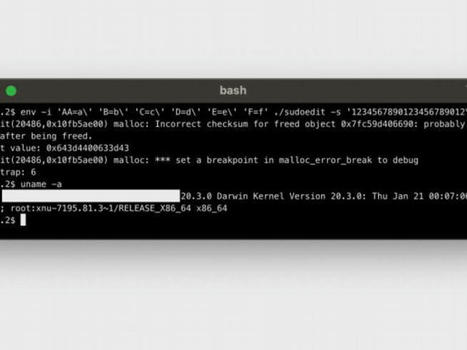 Your new post is loading...
 Your new post is loading...

|
Scooped by
Gust MEES
|
The Hive ransomware gang now also encrypts Linux and FreeBSD using new malware variants specifically developed to target these platforms.
However, as Slovak internet security firm ESET discovered, Hive's new encryptors are still in development and still lack functionality.
The Linux variant also proved to be quite buggy during ESET's analysis, with the encryption completely failing when the malware was executed with an explicit path.

|
Scooped by
Gust MEES
|
Microsoft is warning customers about the LemonDuck crypto mining malware which is targeting both Windows and Linux systems and is spreading via phishing emails, exploits, USB devices, and brute force attacks, as well as attacks targeting critical on-premise Exchange Server vulnerabilities uncovered in March.
The group was discovered to be using Exchange bugs to mine for cryptocurrency in May, two years after it first emerged.
Notably, the group behind LemonDuck is taking advantage of high-profile security bugs by exploiting older vulnerabilities during periods where security teams are focussed on patching critical flaws, and even removing rival malware. Learn more / En savoir plus / Mehr erfahren: https://www.scoop.it/topic/securite-pc-et-internet

|
Scooped by
Gust MEES
|
Three recently unearthed vulnerabilities in the Linux kernel, located in the iSCSI module used for accessing shared data storage facilities, could allow root privileges to anyone with a user account.
The trio of flaws – CVE-2021-27363, CVE-2021-27364 and CVE-2021-27365 – have lurked in Linux code since 2006 without detection until GRIMM researchers discovered them.
“If you already had execution on a box, either because you have a user account on the machine, or you’ve compromised some service that doesn’t have repaired permissions, you can do whatever you want basically,” said Adam Nichols, principal of the Software Security practice at GRIMM.
While the vulnerabilities “are in code that is not remotely accessible, so this isn’t like a remote exploit,” said Nichols, they are still troublesome. They take “any existing threat that might be there. It just makes it that much worse,” he explained. “And if you have users on the system that you don’t really trust with root access it, it breaks them as well.”
Referring to the theory that ‘many eyes make all bugs shallow,’ Linux code “is not getting many eyes or the eyes are looking at it and saying that seems fine,” said Nichols. “But, [the bugs] have been in there since the code was first written, and they haven’t really changed over the last 15 years.” Learn more / En savoir plus / Mehr erfahren: https://www.scoop.it/t/securite-pc-et-internet/?&tag=Linux

|
Scooped by
Gust MEES
|
Rising Linux security developer Alexander Popov of London-based Positive Technologies discovered and fixed a set of five security holes in the Linux kernel's virtual socket implementation. An attacker could use these vulnerabilities (CVE-2021-26708) to gain root access and knock out servers in a Denial of Service (DoS) attack.
With a Common Vulnerability Scoring System (CVSS) v3 base score of 7.0, high severity, smart Linux administrators will patch their systems as soon as possible.
While Popov discovered the bugs in Red Hat's community Linux distribution Fedora 33 Server, it exists in the system using the Linux kernel from November 2019's version 5.5 to the current mainline kernel version 5.11-rc6. Learn more / En savoir plus / Mehr erfahren: https://www.scoop.it/t/securite-pc-et-internet/?&tag=Linux

|
Scooped by
Gust MEES
|
A British security researcher has discovered today that a recent security flaw in the Sudo app also impacts the macOS operating system, and not just Linux and BSD, as initially believed.
The vulnerability, disclosed last week as CVE-2021-3156 (aka Baron Samedit) by security researchers from Qualys, impacts Sudo, an app that allows admins to delegate limited root access to other users.
Qualys researchers discovered that they could trigger a "heap overflow" bug in the Sudo app to change the current user's low-privileged access to root-level commands, granting the attacker access to the whole system.
The only condition to exploit this bug was that an attacker gain access to a system, which researchers said could be done by either planting malware on a device or brute-forcing a low-privileged service account. Learn more / En savoir plus / Mehr erfahren: https://www.scoop.it/t/securite-pc-et-internet/?&tag=Linux

|
Scooped by
Gust MEES
|
A major vulnerability impacting a large chunk of the Linux ecosystem has been patched today in Sudo, an app that allows admins to delegate limited root access to other users.
The vulnerability, which received a CVE identifier of CVE-2021-3156, but is more commonly known as "Baron Samedit," was discovered by security auditing firm Qualys two weeks ago and was patched earlier today with the release of Sudo v1.9.5p2.
In a simple explanation provided by the Sudo team today, the Baron Samedit bug can be exploited by an attacker who has gained access to a low-privileged account to gain root access, even if the account isn't listed in /etc/sudoers — a config file that controls which users are allowed access to su or sudo commands in the first place. Learn more / En savoir plus / Mehr erfahren: https://www.scoop.it/t/securite-pc-et-internet/?&tag=Linux
|

|
Scooped by
Gust MEES
|
Microsoft has continued its analysis of the LemonDuck malware, known for installing crypto-miners in enterprise environments. It makes a strong case for why it is worth removing it from your network.
This group, according to Microsoft, has a well-stocked arsenal of hacking tools, tricks and exploits aimed at one thing: for their malware to retain exclusive access to a compromised network for as long as possible.
While crypto-mining malware could be just a nuisance, LemonDuck attributes suggest the attacker group really do try to own compromised networks by disabling anti-malware, removing rival malware, and even automatically patching vulnerabilities -- a competitive effort to keep rival attackers from feeding off its turf. Learn more / En savoir plus / Mehr erfahren: https://www.scoop.it/topic/securite-pc-et-internet

|
Scooped by
Gust MEES
|
An information disclosure vulnerability in the Linux kernel can be exploited to leak data and act as a springboard for further compromise.
Disclosed by Cisco Talos researchers on Tuesday, the bug is described as an information disclosure vulnerability "that could allow an attacker to view Kernel stack memory."
The kernel is a key component of the open source Linux operating system. The vulnerability, tracked as CVE-2020-28588, was found in the proc/pid/syscall functionality of 32-bit ARM devices running the OS.
According to Cisco, the issue was first found in a device running on Azure Sphere. Attackers seeking to exploit the security flaw could read the /syscall OS file via Proc, a system used for interfacing between kernel data structures. Learn more / En savoir plus / Mehr erfahren: https://www.scoop.it/t/securite-pc-et-internet/?&tag=Linux

|
Scooped by
Gust MEES
|
Researchers say the new RedXOR backdoor is targeting Linux systems with various data exfiltration and network traffic tunneling capabilities.
Researchers have discovered a new backdoor targeting Linux systems, which they link back to the Winnti threat group.
The backdoor is called RedXOR – in part because its network data-encoding scheme is based on the XOR encryption algorithm, and in part because its samples were found on an old release of the Red Hat Enterprise Linux platform. The latter fact provides a clue that RedXOR is utilized in targeted attacks against legacy Linux systems, noted researchers.
The malware has various malicious capabilities, said researchers – from exfiltrating data to tunneling network traffic to another destination. Learn more / En savoir plus / Mehr erfahren: https://www.scoop.it/t/securite-pc-et-internet/?&tag=Linux

|
Scooped by
Gust MEES
|
CERTFR-2021-AVI-138 : Multiples vulnérabilités dans le noyau Linux de SUSE (22 février 2021)
De multiples vulnérabilités ont été découvertes dans le noyau Linux de SUSE. Certaines d'entre elles permettent à un attaquant de provoquer un problème de sécurité non spécifié par l'éditeur, une exécution de code arbitraire et un déni de service. Learn more / En savoir plus / Mehr erfahren: https://www.scoop.it/t/securite-pc-et-internet/?&tag=Linux

|
Scooped by
Gust MEES
|
A small but complex malware variant is targeting supercomputers worldwide.
Reverse engineered by ESET and described in a blog post on Tuesday, the malware has been traced back to attacks against supercomputers used by a large Asian Internet Service Provider (ISP), a US endpoint security vendor, and a number of privately-held servers, among other targets.
The cybersecurity team has named the malware Kobalos in deference to the kobalos, a small creature in Greek mythology believed to cause mischief.
Kobalos is unusual for a number of reasons. The malware's codebase is tiny but is sophisticated enough to impact at least Linux, BSD, and Solaris operating systems. ESET suspects it may possibly be compatible with attacks against AIX and Microsoft Windows machines, too.
"It has to be said that this level of sophistication is only rarely seen in Linux malware," commented cybersecurity researcher Marc-Etienne Léveillé. Learn more / En savoir plus / Mehr erfahren: https://www.scoop.it/t/securite-pc-et-internet/?&tag=Linux

|
Scooped by
Gust MEES
|
According to Checkpoint, the “FreakOut” malware attack is exploiting “newest vulnerabilities.”
Cybersecurity researchers identify vulnerabilities regularly, some serious, some not. In the latest, researchers from Checkpoint have discovered a range of attacks against Linux devices.
Dubbed FreakOut; the malware attack is being carried out to create an IRC botnet. It is worth noting that an IRC Botnet is a collection of machines infected with malware that can be controlled remotely via an IRC channel.
Done by a threat actor named “freak;” the botnet in question would allow attackers to perform malicious tasks such as brute-forcing attacks, network sniffing, killing processes, crypto-mining, and DDoS attacks.
Delving into the details, the campaign is not aimed at the masses but chooses a targeted approach in which it only attacks systems running the TerraMaster operating system ZEND framework or Liferay Portal. What’s troubling is that all 3 have a significant number of users globally. Learn more / En savoir plus / Mehr erfahren: https://www.scoop.it/t/securite-pc-et-internet/?&tag=Linux
|



 Your new post is loading...
Your new post is loading...


















The Hive ransomware gang now also encrypts Linux and FreeBSD using new malware variants specifically developed to target these platforms.
However, as Slovak internet security firm ESET discovered, Hive's new encryptors are still in development and still lack functionality.
The Linux variant also proved to be quite buggy during ESET's analysis, with the encryption completely failing when the malware was executed with an explicit path.
Learn more / En savoir plus / Mehr erfahren:
https://www.scoop.it/t/securite-pc-et-internet/?&tag=Linux